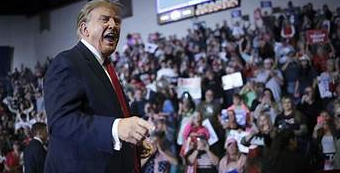In the era of Trumpian politics, the US’s allies must fortify and regroup: they can no longer rely on the guaranteed support of a superpower.
Can Europe continue to rely on the United States for security in the era of Trump? The Republican candidate for president has now provided his answer: it cannot, and perhaps should not.
On February 10, at a rally in South Carolina, Donald Trump announced that he would “encourage” Russia to attack any NATO member that failed to meet the defense spending target of 2% of GDP. This comment directly contradicted NATO’s core principle: the idea that an attack on one member constitutes an attack on all, which obliges other members to come to its defense.
Trump’s statement sends shockwaves across Europe, highlighting the potential vulnerability of the continent if he were to regain the presidency. Under Trump’s previous administration, the U.S. frequently questioned its commitments to international alliances, including NATO, and Europe had to contend with the growing unpredictability of American foreign policy.
The shift in U.S. policy, led by Trump’s rhetoric, forces European nations to rethink their own defense strategies and security frameworks. No longer can European countries assume that the U.S. will be a steadfast and reliable protector. As a result, Europe is facing an era of insecurity in which it must take greater responsibility for its own defense.
This changing landscape means that European countries will need to strengthen military cooperation among themselves, invest more in defense, and explore new alliances. The EU has already begun discussing the need for greater autonomy in terms of defense capabilities, yet achieving this will require overcoming internal divisions and aligning national priorities.
In this new geopolitical reality, Europe is being forced to reimagine its security in a way that does not depend solely on U.S. protection. Whether through increased defense spending, the development of a more unified European defense force, or alternative diplomatic and military alliances, the future of Europe’s security will no longer rest entirely on the shoulders of Washington.
The implications of Trump’s stance on NATO underscore the reality that global power dynamics are shifting. If the U.S. retreats further from its traditional role as the guarantor of global security, Europe and other allies will need to step up and safeguard their own interests, with or without American support.

